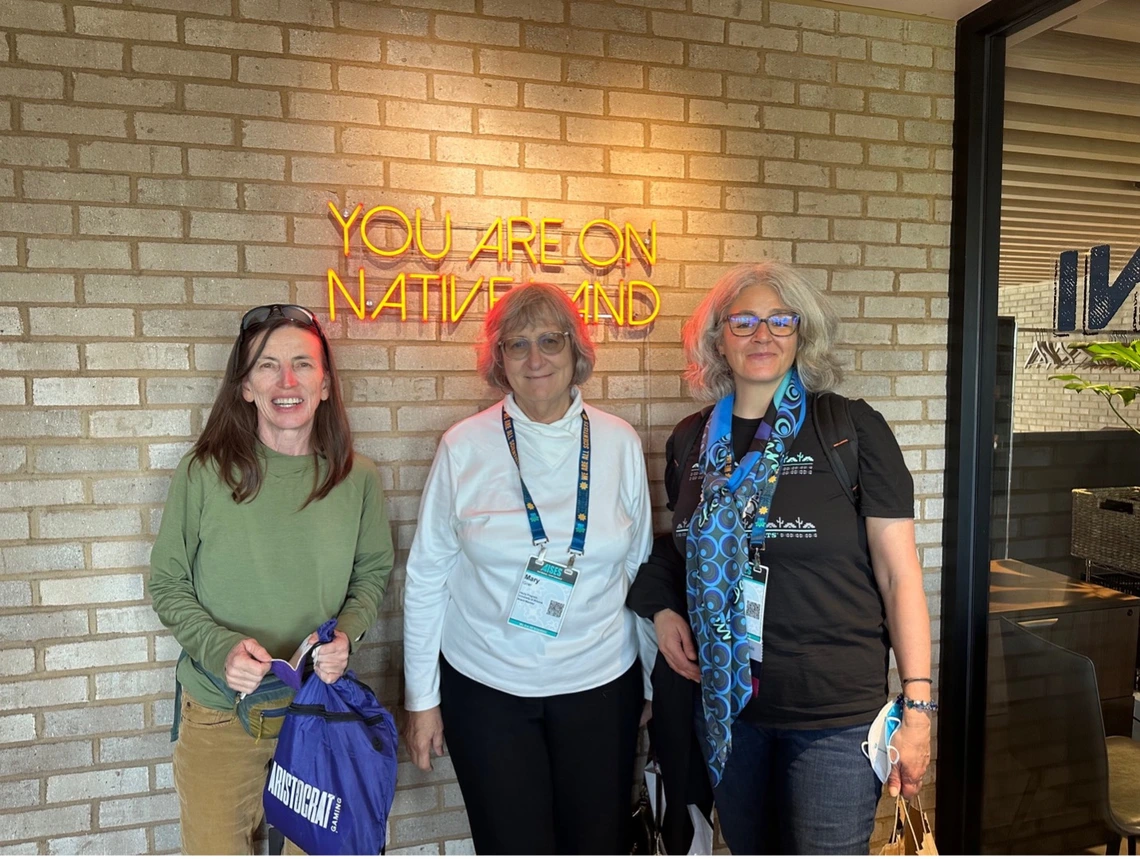University of Arizona proudly representing at the 2025 AISES Conference which centered the importance for Indigenous representation and resilience in higher education and STEM fields
American Indian Science and Engineering Society (AISES) held their annual conference on the lands of Lakota and Ojibwe peoples in Minneapolis, Minnesota from October 2 through October 4, 2025. This year’s conference was entitled “We are all Scientists”. This is a unique, three-day event focusing on educational, professional, and workforce development for Indigenous peoples of North American and the Pacific Islands in science, technology, engineering, and math (STEM) studies and careers. The conference is open to anyone who wishes to participate and learn. With over three thousand participants, including students, university faculty and staff, professionals, elders and community members, this event is unique not just because of its size and diverse programming but the supportive, encouraging and inclusive environment for Native American students, Indigenous scientists and allies.
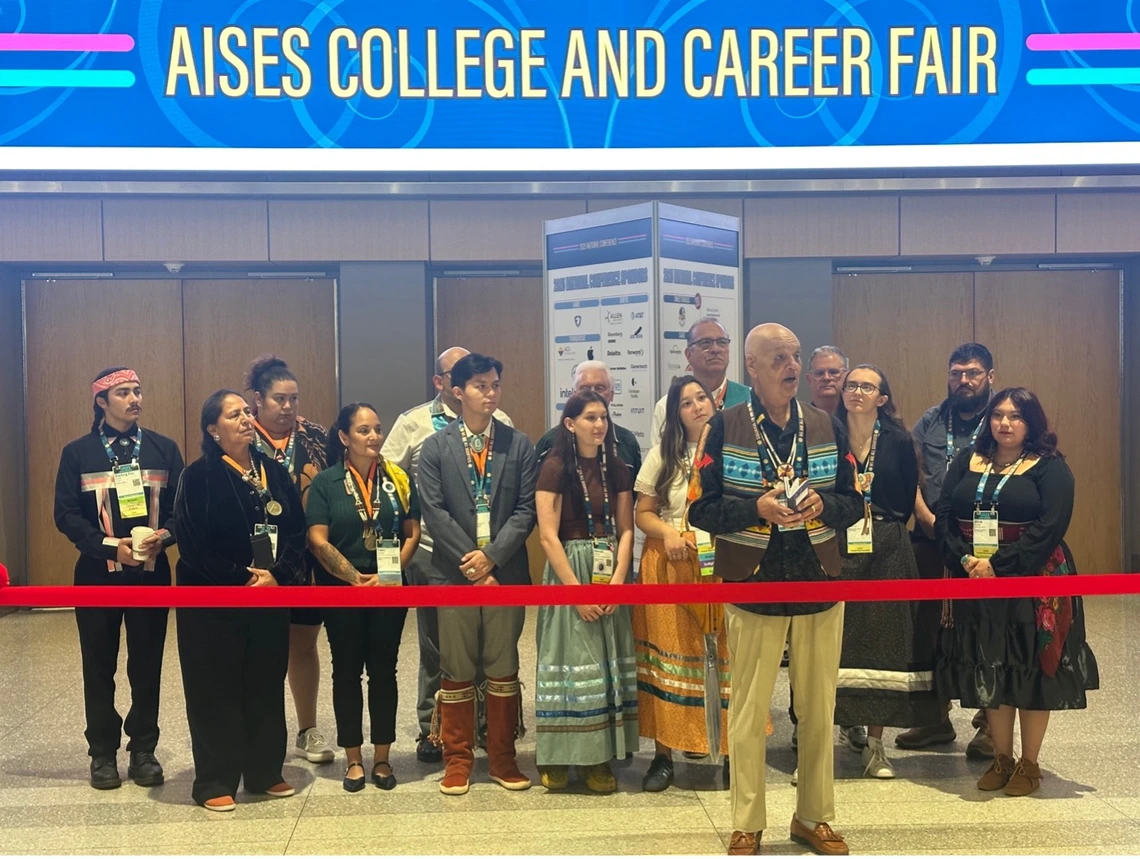
Ribbon Cutting Ceremony for the 2025 AISES College and Career Fair
Photo Credit: Nina Sajovec, Haury Program
The event featured numerous workshops and presentations, talking and beading circles, tours, mock interviews for students, as well as opportunities to visit with elders, and engage in cultural activities and events. The conference also includes the College and Career Fair (the largest of its kind) with over 300 exhibitors from tribal organizations, colleges and universities, and STEM-related companies looking to recruit Indigenous talent. As the University of Arizona continues to rank among the top 200 colleges for Indigenous students by AISES, several U of A programs exhibited, including University of Arizona Graduate Center, Mentorship and Education in Science for Tucson (MESCIT) with Society of Indigenous Physicists, and Agnese Nelms Haury Program with Office of Admissions - Undergraduate Recruitment and Tucson College of Medicine.
“The University of Arizona Office of Admission's presence at such conferences not only demonstrates our commitment to serving students and the Native American community, but also lets people know that we are a resource and option as they consider their life goals,” said Julia Eischeid, the Associate Director of the Undergraduate Recruitment. “We are dedicated to sharing pathways to the U of A with students, families, educators, and all future Wildcats! Our office is the "welcome mat" to the university, and students' future participation in the various campus supports and programs. That is why we enjoy attending these types of conferences, because we can share those contacts and processes right at the source. By partnering with other university colleges and departments, our presence is impactful, memorable, and truly showcases our Bear Down spirit!” Justin P. Archer, the Regional Manager of Mountain West Admissions, who was on the ground that day, added: “I really enjoyed the strong sense of community throughout the conference.”
Jose Luis Munoz Jr., the Director of University of Arizona College of Medicine – Tucson, reflected: “The AISES Conference was an incredibly meaningful experience for me, especially as a first-time attendee. Being surrounded by Indigenous scholars, students, and leaders in STEM was both grounding and inspiring. It reaffirmed how vital it is that we continue building and strengthening pathways for Indigenous students into STEM and medicine, but to honor and elevate Indigenous knowledge and perspectives. I left the conference feeling energized and hopeful, with a deeper commitment to continuing this work at the University of Arizona College of Medicine-Tucson and beyond.”
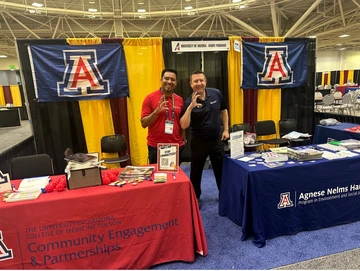
Jose Munoz and Justin Archer at the 2025 AISES College and Career Fair
Photo Credit: Nina Sajovec, Haury Program
The Haury Program booth also focused on presenting a wide variety of University of Arizona programs that serve Native American students, staff, faculty and communities in collaboration with Native American Initiatives, Native American Student Affairs, Native SOAR, Indigenous People Law and Policy Program, Native Nations Institute, Indigenous Resilience Center and A Student’s Journey. At the Haury booth, visitors were also able to fill out a postcard with a message to address bodies of water as a part of “Dear Body of Water” project by the U of A Poetry Center. Postcards featured were of water images from the Navajo Nation, taken by students and U of A staff.
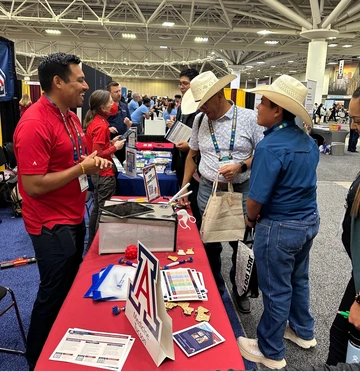
University of Arizona Haury Program booth at the 2025 AISES College and Career Fair
Photo Credit: Nina Sajovec, Haury Program
During the College and Career Fair, high school, undergraduate and graduate students got a chance to present their research by doing a poster or oral presentation, including several University of Arizona students. Masters Student Nieves Vazquez won the graduate poster award for her poster entitled “Relationality in Analysis: Science Communication in Soil and Water Quality Research for Resilient Communities”, and Gwen Flores won the undergraduate poster award for poster entitled “Mineral Formation Affecting Biosorption of Metal with Fungi for Bioremediation Applications”. Also competing was Jaria Callado. All three students mentioned here members of the University of Arizona Níhí Lab, which is led by Dr. Cherie De Vore. This group converges engineering, Indigenous knowledge, and environmental stewardship to imagine and implement solutions that restore balance, draw inspiration from the environment itself—its resilience, its adaptive systems, and its capacity for regeneration. “Congratulations to them!” said Dr. De Vore, “I am very happy and proud to see my students shine and thrive.”
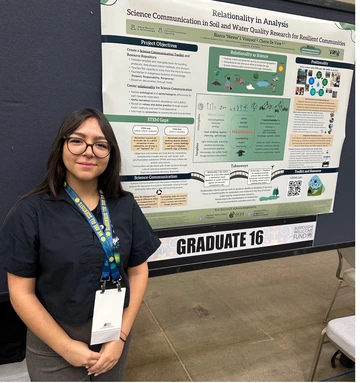
Nieves Vazquez in front of her award-winning poster.
Photo Credit: Nina Sajovec, Haury Program
Another University of Arizona student who competed and won was LaCher Pacheco. Pacheco's 20-minute presentation entitled Wild Greens: Decolonialism, Relationality, and Spirits, earned a perfect score of 16/16 from volunteer judges, and was selected as one of the winners in the oral presentation category.
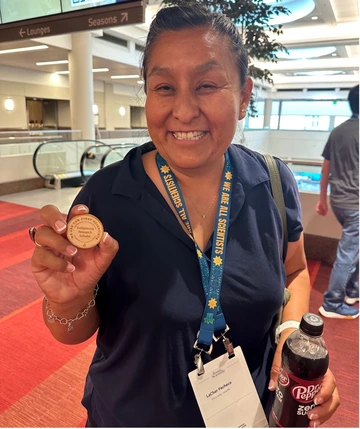
U of A PhD Student LaCher Pacheco shows off her more than deserved award token.
Photo Credit: Nina Sajovec, Haury Program
Pacheco and Vazquez, who are both also a part of the 2025 Haury Program Indigenous Resilience Graduate Awards cohort, acknowledge and thank their mentors. Vazquez added: “Thank you deeply to Haury for supporting us, as students who struggle to find our footing as scientists without betraying or losing sight of our communities.”
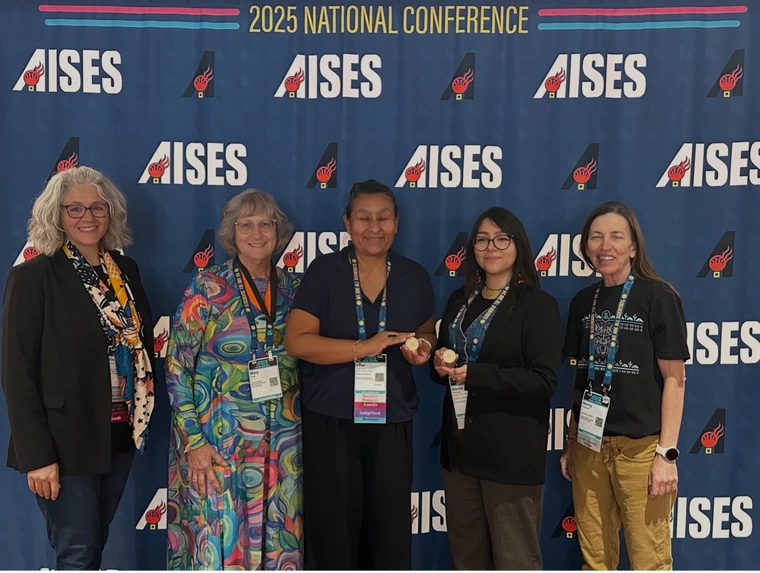
U of A Haury Program staff and DAF Board member, Mary Grier, with LaCher Pacheco and Nieves Vazquez, 2025 Haury Indigenous Resilience Graduate Research awardees, after both students won in their categories of presentations.
Friday and Saturday at the conference also featured numerous interactive, upbeat and inspiring workshops. They offered thirteen tracks from Art, Architecture, and Design, Biological Sciences, Community Building, Computer and Information Science Engineering, Education, Engineering, Environmental Science and Sustainability, Health & Medical Sciences, Indigenous Knowledge, Mathematical and Physical Sciences, Professional & Workforce Development, Social & Behavioral Sciences, STEM & Business and STEM Activities Day sessions. Two University of Arizona programs also presented workshops. A Student’s Journey Program shared their model for enabling smoother transition from tribal colleges to universities, and received excited responses from other universities who wish to introduce similar programs. "A Student’s Journey (ASJ) team is grateful for the opportunity to share our work and framework at AISES,” said Mayra Vargas, Project Manager. “The conference was an amazing space to connect with others interested in collaboration and in supporting their students through programs like ASJ. Most meaningful of all was seeing six ASJ alumni there, continuing to grow, lead, and shine in their fields, a powerful reminder of why this work matters."
And for the first time ever, the Haury Program, U of A-embedded philanthropic unit focusing on supporting Indigenous resilience research, outreach and pathways, shared their knowledge and tips as funders through a hands-on participatory workshop entitled “You Decide Who Gets Funded!” Over 30 participants were invited to learn how to make their best proposal by experiencing what proposals look like from the perspective of a funder. Participants including students and program managers reviewed and awarded proposals based on a fictional call for applications, and actively engaged in arguing for their proposals as well as group brainstorming on how to prepare convincing and competitive proposals, which, as several of participants expressed, is an especially important skill right now in the light of drastically changed funding landscapes.
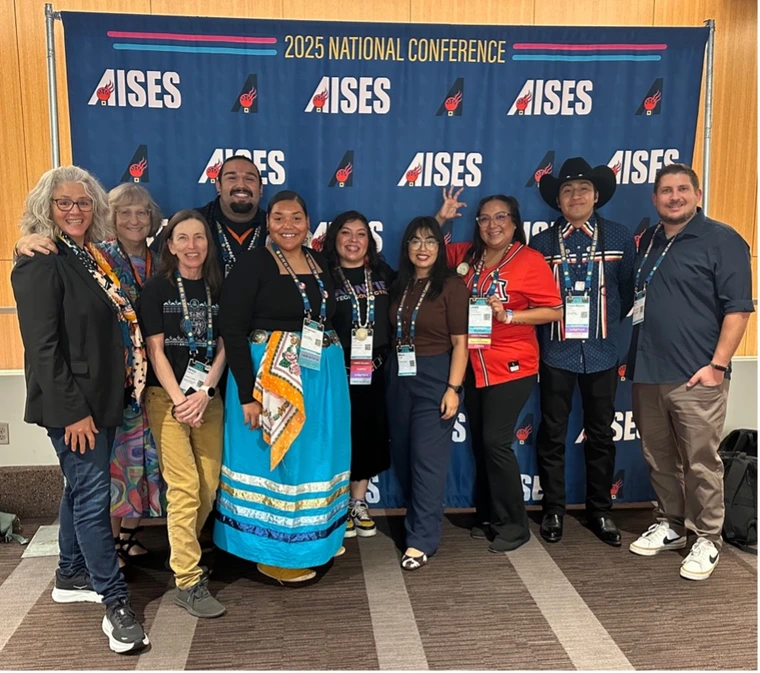
The Haury Program with A Student’s Journey managers and graduates.
After intense three days, the conference concluded with a large awards banquet where University of Arizona’s own Dr. Cherie De Vore (Diné), Assistant Professor of Chemical and Environmental Engineering, was named the 2025 AISES Most Promising Engineer/Scientist. “Dr. De Vore is the first Native American professor in the history of the University of Arizona’s School of Engineering. As assistant professor of chemical and environmental engineering, she is principal investigator of the Níhí Biogeochemistry Environmental Engineering Laboratory, as well as core faculty member of the Indigenous Resileince Center,” wrote Dr. Karletta Chief, Director of University of Arizona Indigenous Resilience Center. “This is a huge accomplishment! Dr. De Vore is grounded and rooting in traditional knowledge systems in her engineering research, and this award is well deserved.” Dr. De Vore received a standing ovation as she went to the stage to receive the award.
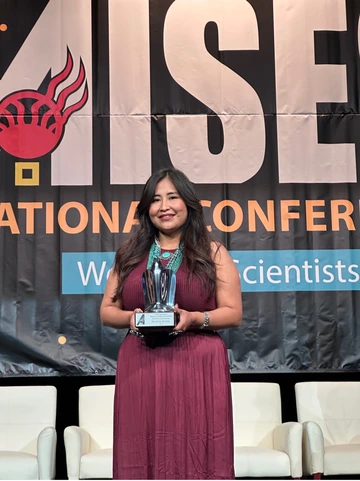
Dr. Cherie DeVore was named the 2025 AISES Most Promising Engineer/Scientist at the 2025 AISES National Conference.
“Receiving the AISES Most Promising Engineer Award is an incredible honor, one that holds profound meaning because it comes from within the Native American STEM community across Turtle Island. To be recognized by my peers (brilliant Indigenous scientists, engineers, and mentors who have dedicated their lives to advancing our communities through science and sovereignty) is deeply humbling.
I am especially grateful to my colleagues and mentors, Drs. Karletta Chief and Jose Cerrato, whose nomination reflects not only their belief in me but also the spirit of kinship and reciprocity that defines our work. None of what I do happens in isolation. This award belongs equally to my family, my students, our lab group, and the larger community of the Indigenous Resilience Center at the University of Arizona. I also want to express heartfelt gratitude to the Haury Foundation, whose unwavering support has strengthened not only our lab and IRes but also the broader movement to center Indigenous leadership across the University of Arizona. Their commitment has made it possible for our ideas, partnerships, and students to thrive. Together, we strive to build pathways that center Indigenous knowledge systems in engineering: to design with, not for, our communities and to innovate in ways that honor our lands, waters, and ways of knowing.
Throughout my career, I’ve sought to use my engineering training as a form of praxis, a living commitment to uplift Indigenous voices, build capacity, and shape solutions grounded in self-determination and respect. This recognition from AISES affirms that this collective vision is not only possible but thriving. I carry this award with gratitude and responsibility, and I hope to continue creating space for the next generation of Indigenous engineers to ensure that our work continues to serve our people and our planet. Ahé’hée (thank you). -Dr. Cherie De Vore
Thanks to the funding by the Haury Program, the U of A AISES Chapter was able to bring 14 students from the chapter to the 2025 AISES National Conference. “The goals for the students,” shared Laela Bitahey, chapter’s historian, “were to make new connections, gain insight on internship and scholarship opportunities for future and current members, and be in community with other Indigenous scholars. The event focused on fostering meaningful bonds, strengthening connections, and celebrating indigenous resilience. Students learned,” she continued, “the importance of fostering professional and cultural connections within the Indigenous STEM community. We’ve gained insight into professional development, internships, and graduate schools through the national conference. This conference emphasized the importance for Indigenous representation and resilience in higher education and STEM fields.”
“Attending the AISES National Conference was such a rewarding experience, from representing MNUA at the powwow and banquet to connecting with other Indigenous leaders as an AISES officer. It was a wonderful opportunity to connect, share, and learn alongside so many inspiring Indigenous professionals and students. One of my favorite moments was meeting and visiting with other royalty during the powwow. I love hearing what we are each doing as leaders in our communities. It is always so inspiring to see how our voices and platforms come together to create change.This year’s conference theme, “We Are All Scientists,” truly resonated with my platform, “Walking in Two Worlds: Bridging Traditional Ecological Knowledge and Western Education.” By bringing these two ways of knowing together, we strengthen how we learn, support our communities, and most importantly uplift Indigenous voices. A special congratulations to Dr. Cherie DeVore, our co-AISES advisor, for receiving the Most Promising Engineer or Scientist Award. Your leadership and dedication continue to inspire us all ahéheeʼ (thank you).” - Daelyn Nez, U of A AISES chapter student member and current Miss Native UA 2025-2026
“Some highlights and lessons learned of the AISES 2025 National Conference were seeing the entirety of tribes in the opening ceremony in the grand ballroom of the first day we were there as it shows me a small perspective of the many indigenous people who are striving for a higher education or have already completed that chapter in their life and are giving back in their own ways.” - Kendrick Begay, U of A AISES chapter student member
“One of the highlights of the conference was participating in the Boston Scientific Tour, which I found incredibly insightful. This intimate experience provided a look at what it’s like to work at Boston Scientific and introduced me to Indigenous professionals within the company. I also learned about employee resource groups such as FIRE (Fostering Indigenous Resources and Empowerment), which are designed to support Indigenous employees and foster community within the workplace.” - Janelle Etsitty, U of A AISES chapter student member
“From the conference we as a chapter are walking away with inspiration and purpose,” added Bitahey. “This experience highlighted the importance of Indigenous resilience and representation in STEM and reaffirmed the need for our presence in these spaces. Being surrounded by Indigenous professionals, scholars, and students reminded us that our voices and perspectives are vital. The conference motivated us to continue striving for our education, Indigenous excellence, and to create pathways for future generations of Indigenous students in academia and professional fields.”
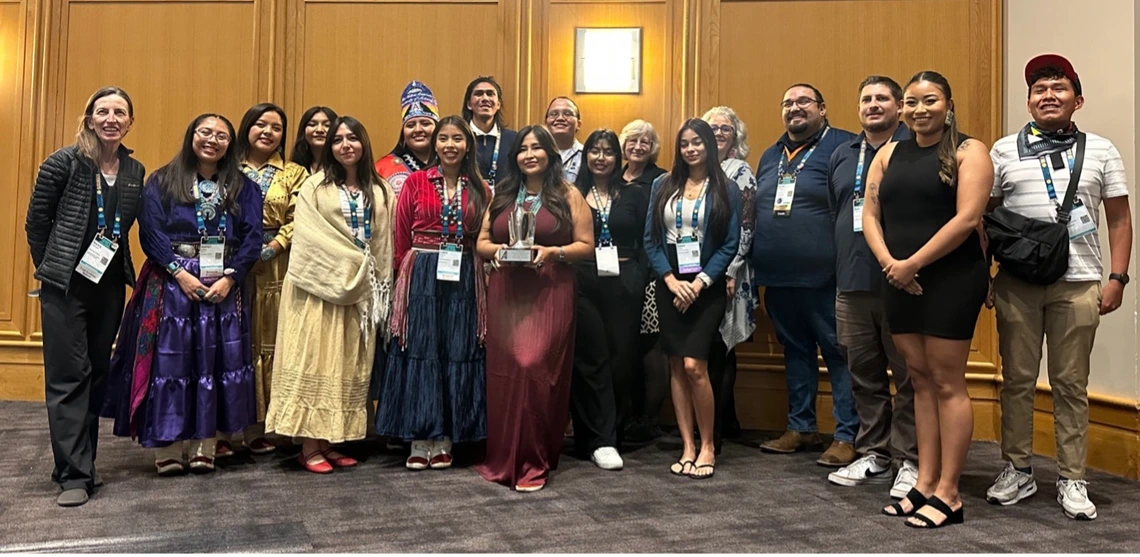
U of Arizona participants who attended the 2025 AISES National Conference’s closing banquet, with Dr. DeVore, 2025 AISES Most Promising Engineer / Scientist.
For Nancy Petersen, the Assistant Director of the Haury Program, this was her fourth AISES Conference: “From the vibrant colors in the design logo to the brilliance of the students, the 2025 AISES National Conference felt more like a celebration than a conference, bringing together first-time student attendees, with long time members of AISES ranging from healers, elders, mentors, teachers, high tech companies, dedicated Federal employees and more. This is a unique Indigenous STEM experience truly honoring, “We are all Scientists” that I hope more of the UA campus will explore.”
Next year, the 2026 AISES National Conference will be held in Portland, Oregon, October 15 -17. If your program is interested in attending and / or becoming involved, please contact Katarina “Nina” Sajovec Altshul, Haury Program Grants, Communications and Outreach Manager.

